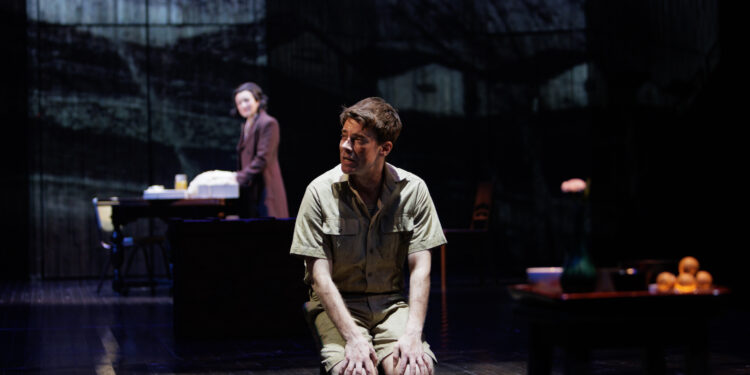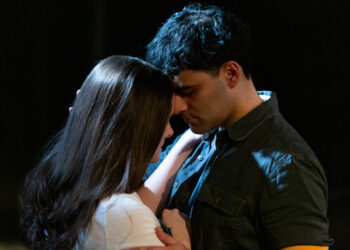Now on stage at the Tom Patterson Theatre at the Stratford Festival, 111 Lakeside DriveVOICE CHOICE
“Grounded with remarkable and realistic performances. Stratford’s ‘Forgiveness’ reminds us of the power and reach of this word, as well as its ability to transform others. Astonishing! Inspirational! Another one to see on your summer theatre list. Yoshie Bancroft and Jeff Lillico are exceptional.”
Adapted from the Canada Reads-winning memoir by Mark Sakamoto, the stage version of ‘Forgiveness’ tells the story of two people: Mitsue Sakamoto (Yoshie Bancroft) and Ralph MacLean (Jeff Lillico), who have been traumatized by the events of World War Two. Throughout this inhumane treatment by others, Mitsue and Ralph do not allow the war to break them.
A memory play, ‘Forgiveness’ delves truthfully back and forth in time between 1936 and 1968. When this occurs, video projection designs indicate the year in which a particular scene takes place.
Mitsue and her family, consisting of father Yosuke (Hiro Kanagawa), mother Tomi (Manami Hara), and brother/son Patrick (Douglas Oyama), live a Western culture lifestyle. They speak English in the house instead of Japanese. Tomi makes Western culture food. The parents work hard. All this changes after the bombing of Pearl Harbour when the family goes to a Japanese Canadian internment camp. Ralph joins the Canadian army and endures four years of inhumane treatment in a Japanese prisoner-of-war camp.
Long after the war ends, Mitsue and Ralph’s anger, grief and hurt have not appeared to dissipate. In 1968, when Mitsue’s son, Stan (Douglas Oyama), and Ralph’s daughter, Diane (Allison Lynch), begin dating, the mother and father find themselves reliving the feelings and emotions from long ago once again.
The three-quarter in the round setting of the Tom Patterson Theatre becomes an ideal choice to stage this production. Lorenzo Savoini and Kaileigh Krysztofiak’s set and lighting designs capture the audience’s attention as soon as they enter the auditorium. Several items on the stage undoubtedly become essential reminders and memories to all of the characters. Yoshie Bancroft and Jeff Lillico remain on stage as the audience enters. They are silent and do not make eye contact with the audience. Instead, the actors move slowly around the stage, looking at the props and remaining still before moving again.
When the play begins, Bancroft and Lillico break the fourth wall and speak to the audience. It is an effective dramatic technique because I got the impression that the two were talking to me individually rather than in a large group. A human, personal touch that works.
Savoini’s costume designs nicely remain spot-on. There’s a significant range in clothing style from 1936 to 1968, and he sharply showcases the differences, from the earth-tone browns of the soldiers’ war costumes to the bright pastel colours in the dresses and bell-bottom pants.
Sammy Chien’s projections and Cindy Mochizuki’s original illustrations and animations remain outstanding and noteworthy. They serve as helpful reminders of historical periods as the story goes back and forth in time. The projections also become sombre and graphic reminders of Canada’s dark colonial past that audiences cannot ignore. While some of these historical visuals are horrific and ugly, they are necessary to confront since forgiveness involves healing.
Director Stafford Arima makes an intuitively articulate comment in his programme note about the healing power of forgiveness: ”
Forgiveness (the noun) is not an easy thing to do. To forgive is not passive, nor is it a sign of weakness… Forgiveness can be an act of courage.”
Arimac does not blame. Instead, his empathetic directorial vision for ‘Forgiveness’ confronts the horrific issues of what happened to Japanese Canadians with courage, compassion and grace. Humour also abounds plenty (and is necessary) in this confrontation. Steven Hao’s creditable performance of the three possible suitors who come to try and encourage Mitsue to marry him is only one example. It’s hilarious to watch how Hao magically moves from one suitor to the next within a matter of seconds.
It is this formidable cast that boldly draws attention to the courageous power of forgiveness in the play. In calling attention to this power, Arima once again writes in his programme note: “The protagonists catapult the audience on an adventure of awakenings.” These awakenings serve as reminders of the importance of continually developing a knowledgeable, contextual understanding. ‘
Forgiveness’ reminds the audience how far we have advanced in living and understanding the Canadian mosaic and how far we still need to go.
Mitsue’s parents, Hiro Kanagawa and Manami Hara, give heartfelt performances. Their Yosuke and Tomi are respectable, hard-working people who only want the best for their children. Even Mitsue’s friend Miyoko (a wonderfully sassy June Fukumura) acknowledges that. By twenty-first-century standards, the parents didn’t have to stop speaking Japanese at home. Yosuke and Tomi endured awful racial slurs and epithets when they came to live in Canada. They adopted some Western culture when they didn’t have to, most notably when Tomi thinks of cooking a ‘Canadian’ dish for dinner with Diane and her family.
Hara’s Tomi remains on the path to continued forgiveness for what she and her family have endured. The deliberate harshness in Kanagawa’s convincing portrayal of Yosuke indicates he remains behind Hara’s Tomi, who speaks with understanding and acceptance in her voice.
Yoshie Bancroft and Jeff Lillico deliver exceptional and often heartbreaking performances as the central protagonists. While the young Mitsue and Ralph have dreams of accomplishing great things later in life (she is a schoolteacher, and he is in the army), the tone becomes terrifying when the reality of the war sets in. The authorities send the Sakamotos to the internment camp while Ralph goes to a Japanese prisoner-of-war camp. While Mitsue’s future husband, Hideo (solid work by Michael Man), struggles with interment that will last a long time, Bancroft’s adult Mitsue remains hopeful, even when the world around her appears to crumble.
Ralph is an impressionably emotional young man, and Lillico plays that quality believably. Moments with his mother (Jacklyn Francis) and father (Sean Arbuckle) are either poignantly sad or sternly cruel. Francis’s performance as an afraid mother who is concerned about her son’s PTSD when he returns home after the war pierces the heart. Arbuckle’s stern, harsh, and cruel father figure is sickeningly real and will explain why Ralph turns out the way he does at the dinner with the Sakamotos.
Arima finally writes:
“When theatre artists do their job well, we might offer the world something it desperately needs right now – a path forward, not through vengeance, but through virtue.”
These tremendous theatre artists accomplish what their director wants for the audience – a path forward through the virtue of listening, hearing and understanding as we venture further into the twenty-first century.
Please go and see ‘Forgiveness.’
Running time: Two hours and 45 minutes with one interval/intermission.
‘Forgiveness’ runs to September 27 at the Tom Patterson Theatre of the Stratford Festival, 111 Lakeside Drive. For tickets, stratfordfestival.ca or call 1-800-567-1600.
FORGIVENESS by Hiro Kanagawa
Adapted from the Book’ Forgiveness: A Gift from My Grandparents’ by Mark Sakamoto
Directed by Stafford Arima
Set and Costume Designer: Lorenzo Savoini
Lighting Designer: Kaileigh Krysztofiak
Original Illustrations and Animations: Cindy Mochizuki
Projection Designer: Sammy Chien (Chimerik 似不像)
Composer: Allison Lynch
Sound Designer: Olivia Wheeler
Choreographer: Stephanie Graham
War Consultant: Peter Colenutt
Stage Manager: Alice Ferreyra Galliani
Performers: Gabriel Antonacci, Sean Arbuckle, Yoshie Bancroft, Jacklyn Francis, June Fukumura, 郝邦宇 Steven Hao, Manami Hara, Hiro Kanagawa, Allison Lynch, Michael Man, Silvae Mercedes, Evan Mercer, John Ng, Douglas Oyama, Joe Perry, Leon Qin, Nadine Villasin, Jennifer Villaverde, Norman Yeung
















